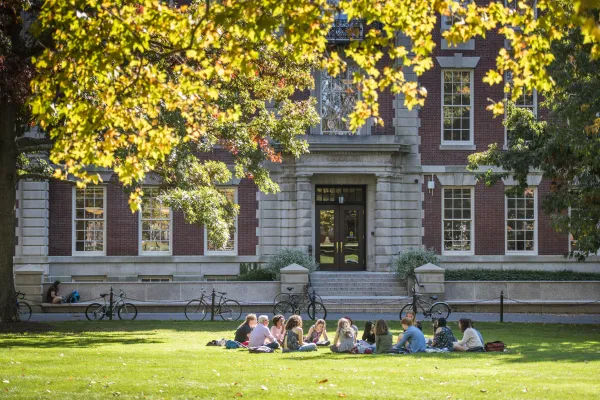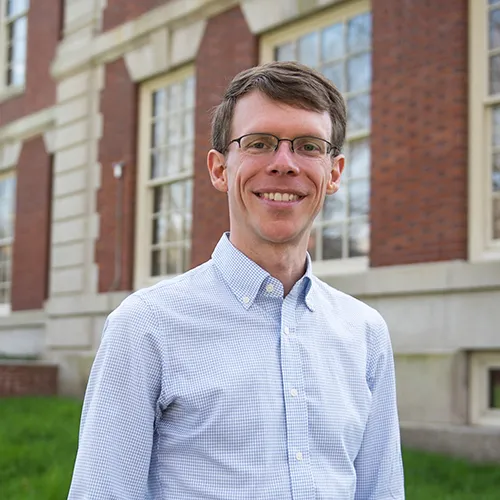Meeting the Moment
Research & Inquiry
Smith faculty members share thoughts about teaching in uncertain times

In nice weather, it’s not uncommon for professors to take their classes outside.
Published April 22, 2025
Assistant Professor of Government Claire Leavitt tries to avoid using the word “unprecedented” to describe the national political situation.
An expert in American governmental institutions, Leavitt feels it’s important to provide historical examples of other eras when election results have been challenged and business leaders have exercised undue influence, to remind students that “this kind of thing has happened before and we’ve gotten through it.”
For Professor of Psychology Benita Jackson, meeting the moment means helping her students develop the capacity to “look at hard things squarely in the face,” with tools for managing their responses “so they don't get stuck in a state of overwhelm or hopelessness.”
And for Alex Barron, associate professor of environmental science and policy, the key is maintaining a focus on solutions to urgent problems—regardless of whether the party in power supports such efforts.
“I think a lot in my teaching about how to restore the joy and wonder and vision that can come from working on these problems,” he says, “to build up a sense of agency so that students can think about how to align their capacities and passions with ways they can make constructive change.”
In the first in a series of stories about teaching in uncertain times, we invited the three faculty members to reflect on how—or whether—they are adjusting lesson plans and teaching strategies to respond to the current climate. Here are excerpts from their conversation.
How are your students reacting to our present historical/political moment?
Claire Leavitt: “The 2016 election was such a shock and there was a sort of resist-by-any-means-necessary mindset. This time around, students seem more resigned. At the same time, I will also say that they’re more amenable to practical solutions and analysis. I’ve had a few students who said they should not have voted for third-party candidates or, ‘Wow, I really had no idea how bad it was going to get.’”
Benita Jackson: “I’m a health psychologist, so I think a lot about mind and body, and about fight, flight, or freeze responses. In my classes, I’m seeing more fear, which is a freeze response. But when I set up chances for students to connect with each other in the classroom, even after some initial hesitation they tend to quickly melt into those opportunities and really benefit from them. Even simply inviting them to find someone to talk to that they haven’t spoken to before. They’re very glad to have the chance to do that.”
Alex Barron: In the short term, students—like pretty much anyone else paying attention—go through cycles of feeling really overwhelmed. They don’t always feel they have the capacity to talk about or understand which of the many, many things happening are the ones they should be most concerned about. It’s been critical for me to reflect for students other ways they can have an impact on problems in the world; different avenues for power and influence that are not just about Congress or the president.
What is a specific teaching strategy you’ve employed since the 2024 election?
AB: “Last semester I was teaching Environmental Policy and I knew there were two possible outcomes in the election, and that students were going to have very different emotional and intellectual responses. I made a conscious choice to cover all of the executive branch stuff before November. Afterwards, we focused on state and local government in a really tangible way. I had my students attend a public meeting and submit a public comment on a state-level environmental document. I heard from students that that was empowering at a time when they needed it. This semester, I’m teaching an introductory course and I’ve tried to center examples where productive change has been achieved. Just this week, we’ve been talking about the environmental challenges in cities. I chose to center the class on the transformation that’s been happening in Paris, away from a car-centric culture toward a mode of urbanism that’s got a mix of transit and walkability and bikeability—pointing to examples of solutions.”
CL: “Something that began before the 2024 election is that I decided to teach a course on the American conservative tradition. What I’ve found is that students have started to see the value in an intellectual tradition that really has not much to do with President Trump. There are elements of conservatism in his ideology, but Trump is pretty far removed from the conservative tradition of William F. Buckley, Edmund Burke, or Whittaker Chambers. I’ve found students have gained an appreciation for conservatism, to see the strength in a tradition that they’re not usually exposed to and that, for better or worse, Trump has made them interested in.”
BJ: “I really want students to appreciate and increase their own capacity to tolerate listening and talking with nuance. So, in my health psychology class, I break them up into groups of five for part of the class period, and each person is assigned a rotating role. One person is in charge of leading; one finds passages from the reading to discuss; one person makes creative connections outside of the class; one person has a devil’s advocate role, charged with bringing up opposing points. I think that scaffolding is permission-giving for people to consider multiple perspectives.”
Have you felt constrained at all in your teaching by the current administration’s moves to investigate universities, and eliminate college diversity initiatives and funds for academic research?
AB: “Recognizing that I speak from a position of privilege as a white male U.S. citizen who has tenure, I haven’t felt any pressure or inclination to change what I’m saying in the classroom. I am thinking all the time about my colleagues at other institutions who are doing excellent work but their funding is under threat, or all of my excellent research colleagues who work in the federal government and have to worry about having their jobs eliminated. There’s always some point in the semester where I say, ‘Listen I have worked in two different Democratic administrations. But that tells you less about my politics than you might think.’ My politics are also not the focus of my class. I want a class space where people can come together to think about environmental problems and do that regardless of their political views or ideological leanings.”
How do you help students make sense of the sweeping changes the administration in Washington is making in government infrastructure and services?
CL: “I’ve been eager to draw historical parallels. We’ve talked about tariffs [at different points in American history] and about the election of 1876, where there was a very real possibility that Congress would refuse to certify the election of Rutherford Hayes as president. I think focusing on historical examples helps provide comfort—this kind of thing has happened before and we’ve gotten through it. I also think it’s important to underscore the progress the United States has made. I had a conversation with a student yesterday where I said, ‘Look, 200 years ago if you were a woman between the ages of 13 and 40, your entire life you’d most likely either be pregnant, giving birth, nursing and raising young kids, or dying in childbirth. Biology would dictate your life in a way that, thankfully, doesn’t happen today.’ I think it’s incumbent on us to emphasize that things may seem like they’ve never been worse, but I’m a big believer in the idea that they have never been better. It’s better to be a woman today than at any other point in world history.”
BJ: “I’ve also been thinking about how to focus on international perspectives; that people have lived through all kinds of revolutions and change and social upheaval. As people in the U.S., we have a lot to learn and that learning can be an antidote to fear. We might not be able to eliminate fear, but we don’t have to take direction from it either.”

AB: “I’ve been thinking about the liberal arts lens—the idea that we are trying to teach students to separate opinions and rhetoric from things that are supported by evidence. We’re trying to get them to think about how they can write and speak clearly, including to people who might not share their values. All of those skills apply across the spectrum of liberal arts, those are the core skills that serve us well in these particular political times.”
What are you keeping your eye on going forward?
CL: “I think that the job of anyone studying political science is to figure out how Trump won, and engage with the tactics, ideas, and institutional structures that may have led to his victory. This time around there was no attempted coup, nor did he lose the popular vote as he did in 2016. This was power that was willingly conceded to the Trump administration by a plurality, if not a majority, of the American people. As tough as it sometimes is, I think we owe it to our students to address the question of why Trump won. How can we understand this? And then, how can we get back to liberal democracy?”
AB: “I’m spending a lot more time, both with my students and in my own research, thinking about fundamental institutions of U.S. government and democracy, and how progress on knotty collective social problems depends upon those institutions functioning. I still pay lots of attention to what is happening at the EPA and the Department of Energy, but I’m also closely following attempts to change how our electoral systems work, the attacks on the legal system and the weaponization of the state against law firms that represent clients who have different political agendas than the administration in power. I think it’s going to become increasingly impossible to separate action on environmental policy, which often relies on regulatory agencies and courts and the law, from the broader attacks on institutions as they have functioned in this country.”
BJ: “I’ve been focusing on how we can preserve and expand our cognitive bandwidth. How do we support the wellbeing of people and how, as a culture, can we support that, even in times when it seems impossible? Especially in times when it seems impossible! I’m looking for ways to make room for my students to be messy and make mistakes with their ideas, learn, and be willing to risk going in the direction of creativity and generativity. I want them to have the capacity to go out and do meaningful things.”

